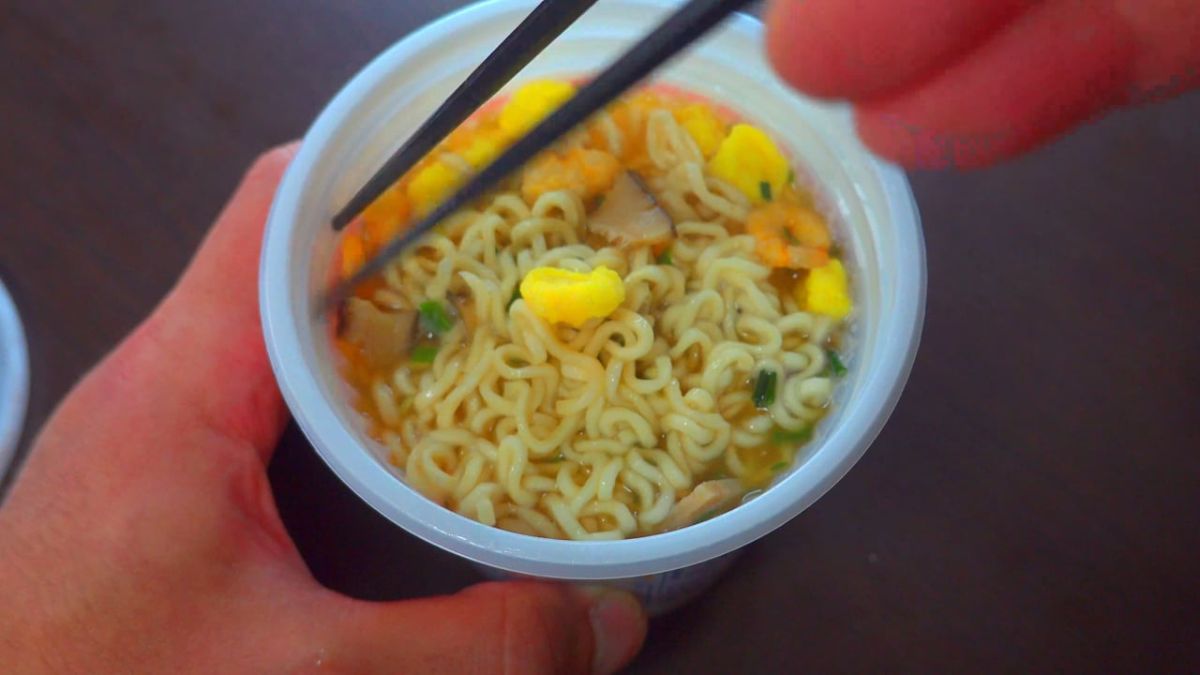Imagine settling into your seat on a Korean Air flight and looking forward to a comforting cup of hot noodles on your six-hour journey. Well, this familiar sight will soon be a thing of the past.
Starting August 15, the national carrier announced that it will no longer offer Shin Ramyeon cup noodles to economy-class passengers on long-haul flights. Instead, the airline said it would replace them with “safer” options like sandwiches, corn dogs, and hot pockets.
However, for those flying in the more luxurious business and first class, the beloved noodle snack will still be on the menu.
But what’s driving Korean Air’s decision to make this menu change? Let’s take a closer look
No more noodles
Korean Air’s decision to remove Shin Ramyeon from its economy class menu stems from rising concerns about turbulence, which has increased significantly since 2019.
“The climate crisis has recently spiked the turbulence’s frequency. Compared to 2019, the frequency has more than doubled this year,” a Korean Air official was quoted as saying by The Korean Times.
According to Reuters, the airline’s move is a proactive safety measure designed to prevent burn accidents. The decision specifically impacts economy class, where narrow aisles and closely packed seats heighten the risk of spills and injuries.
Impact Shorts
More Shorts“You know how one passenger starts slurping that noodle inside the cabin and more people are immediately enticed to order the same thing,” the official told The Korean Times.
“Then the cabin crews get busy preparing food and serving them, sometimes carrying multiple cups at once. When a plane at the same time hits turbulence and shakes, people can get hurt. It’s especially true considering the cup’s design that doesn’t guarantee stability due to its small circular base,” the official further explained.
In contrast, those in the business and first-class passengers will still enjoy cooked ramyeon. why? Because they are served the hot noodles individually in wide and stable dishes, which reduces the risk of accidents.
Korean Air also said last month that due to increased turbulence cases, it would finish long- and medium-haul cabin services 20 minutes earlier, wrapping up services 40 minutes before landing.
This decision comes in the wake of increased concerns about turbulence, highlighted by a severe incident involving a Singapore Airlines flight from London in May, which resulted in one death and dozens of injuries.
How is climate change linked to turbulence?
As global temperatures rise, so does air turbulence, a natural phenomenon significantly influenced by warming. Higher temperatures alter wind patterns and jet streams, leading to increased turbulence. Specifically, warming can accelerate wind speeds in the upper-level jet stream, making it more turbulent.
Over the past 40 years, climate change has already contributed to a rise in turbulence. Research suggests that wind speeds could increase by 2 per cent for every degrees Celsius of global warming. If greenhouse gas emissions continue unabated, temperatures could rise by up to 4 degrees Celsius by the end of this century, exacerbating turbulence.
ALSO READ: Fasten your seatbelts: Is air turbulence becoming more common due to the climate crisis?
Despite these concerns, some social media users are critical of Korean Air’s decision to remove ramen noodles from the menu. They argue that the airline still serves other items that could also cause burns, questioning the rationale behind the change.
The reaction
Korean Air plans to replace the noodles with alternatives like corn dogs, sandwiches, and hot pockets. They will also continue to serve wine mid-air.
“It’s getting more and more cruel,” one user wrote. Another commented, “Cup noodles would be a great in-flight meal compared to some of the crap they sell. Also, don’t they serve coffee and tea anyway?”
One user expressed relief at the removal, saying, “I had hoped the instant noodles would be removed because of the smell.” Another added, “Yeah, that is good. Instant noodles are not healthy,” while a third remarked, “They know that it has always been bad for your health.”
With input from agencies


)

)
)
)
)
)
)
)
)



